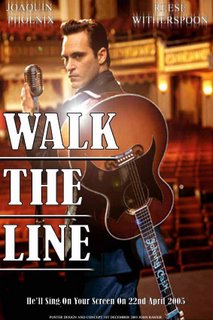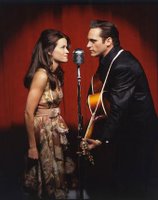Walk The Line

Walk the Line hitches a solid giddy-up into cinematic acheivement.
Official Walk The Line Site
Music/Biography/Drama
Starring Joaquin Phoenix, Reese Witherspoon, Ginnifer Goodwin, Robert Patrick
Rated PG-13 (for language, drug abuse scenes)
Running Time: 136 Minutes
Released:November 18th, 2005




4 Out Of 5 Bites
By now, in the well-saturated VH1 Behind The Music era in which we live, most pop-culture enthusiasts (or your general happenstance slacker) must be keenly versed in the roller-coaster ride type-scene that is the pop music journey into/out-of/into stardom. Born into impoverished (or less than rich) conditions, the subject discovers music, overcomes seemingly insurmountable obstacles to "make it," then falls out of favor into a drug-induced wackiness or soul-searching episode or due to some emergent accident only to find his or her way back. The themes are sequentially familiar and overexposed.
What ensures survivability (musical legends notwithstanding) is the discovery of and submission to something outside of onesself, something infinitely more powerful and gently and warmly coaxing in it's merciful wooing-back to the prospects of hope and thriving, despite past and present circumstances.
What makes Walk the Line work is that we see a side of the man Johnny Cash (Joaquin Phoenix) become something he could have never become on his own. Cash would sit in his Arkansas farm home and listen to the Carter family on the radio (especially the jovial June Carter, played by Reese Witherspoon) while his brother would be buried in the Scriptures, admittedly studying to be a "preacher."
We are soon introduced to the complexities of his struggles in a childhood accident that severs (or at least exacerbates) the strained relationship with his alcoholic father (played stoically by Robert Patrick, who at times didn't strike me as appearing a whole lot older than Phoenix). From that pivotal moment, which would becomes a cesspool of pain from which Cash frequently draws and drinks, comes an ironic flood of creativity and self-destruction.
While stationed in Germany, Cash secretly stole away to hidden places to write music and "Folsom Prison Blues" resulted. Upon returning home and sharing his desire to become a musician with his wife, the dissension between the two is evident in light of his failed stint as a door-to-door salesman. Who can blame Cash (for the job choice)? The problem for Cash at this point is that he does not know himself well enough to lead and love his family. He in fact can't truly love himself or others until some deep-seated emotional issues are raised.
Perhaps one of the most palpable moments in the movie happens early as Cash goes about trying out for a record deal with his patchwork band of lead guitar and upright bass before the great Sam Phillips of Sun Records in Memphis. Anyone who has ever tried out for anything in front of someone (or a group) for whom they needed to impress will not lose touch with the desperation of the moment in this scene, as Phillips ho-hums their worn-out gospel rendition. From his trademark langourous delivery peels away the facade and right there with fiery, but respectful persistence, the Man in Black is born as he breaks out "Folsom Prison Blues."
What happens from this point on is much the history (with some assumed fictional inclusions) of his musical inspirations, his broadening exploration into the riveting exesses his successful lifestyle was affording him and especially his drawing toward June Carter, who would begin touring with him, Elvis, Roy Orbison, Waylon Jennings (played by son Shooter) and Jerry Lee Lewis (hardly a lightweight crew).
 The majority of what rescues Cash is the chronicled journey of his love for June and certainly her love for him.
The majority of what rescues Cash is the chronicled journey of his love for June and certainly her love for him.Two of the most worthy performances of the year are deposited by Phoenix and Witherspoon (who may get a best actor and supporting actress nods for their roles, respectively). Given the fact that Johnny and June weren't the most polished- by finely-tuned vocal standards- this doesn't take away from the acheivement of Phoenix and Witherspoon assuming the vocals in the film on their own.
Walk the Line is finely compelling, primarily in its nostalgic simplicity and the number of generations impacted by the Cash's. My father's generation may well remember hearing "Folsom Prison Blues" on the radio for the first time. His progeny and my Gen-X compatriots grew up for a time with the somewhat catchy radio tune of Cash's daughter Roseanne and her early eighties "Seven-Year Ache." And now the Millenials have Cash's cover of Nine Inch Nails' "Hurt" which received accolades prior to and after his death in September of 2003.
Like him or not, it isn't hard to appreciate Cash's dogged persistence and wildly irreverent journey that ended up in the simple straight and narrow when it needed to be said and done. And, arguably, none other said it or done it quite like he did.

<< Home